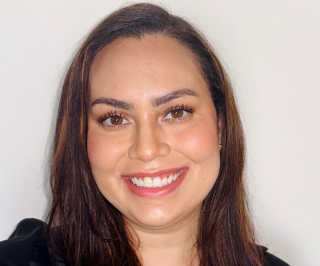
One Year As An Indigenous Early Career Researcher.

Sharna Motlap
NAIDOC Week 2025 marks a powerful 50-year milestone of honouring and elevating Indigenous voices, culture, and resilience, its theme, “The Next Generation: Strength, Vision & Legacy,” resonates deeply with my personal journey.
The journey into academia, particularly as an Indigenous researcher, is paved with unique challenges and rewards. As I reflect on my first year as an Early Career Research Fellow (ECMR), a role I stepped into while still studying, I consider the support systems that made it all possible.
It’s no secret that Indigenous representation in academia, especially among PhD students and ECMRs, is significantly low. This inequity stems from deep-rooted issues in education and the social determinants of health, creating a complex landscape, particularly when research involves Indigenous participants or requires Indigenous perspectives.
Stepping into a Research Fellow position typically designated for a PhD student, while still undertaking my double masters by coursework, felt like being thrown into the deep end. The pressure to overachieve and become hyper-visible was immense, driven by the desire to prove my capability despite being “underqualified” on paper. I had no formal research training; every day was a crash course. I distinctly remember writing ethics applications for my university assessments one day and then submitting real ethics applications for funded projects the next. It was a baptism by fire, demanding constant learning and adaptation.
For the first few months, it truly felt like survival. But as the year progressed, slowly but surely, and I become better at my job. This wouldn’t have been possible without the support and guidance from other Indigenous academics inside and outside my organization. Creating a support network for one another and looking after the next generation is inherent in our culture.
In Indigenous cultures, knowledge transfer has always been an organic, living process. It traditionally happened through direct mentorship and lived experience. Elders and knowledge holders would guide the younger generation, teaching by doing, observing, and storytelling. The Traditional Indigenous Knowledges about Country—the land itself, its seasons, animals, plants, and their intricate interactions, was crucial for survival, ensuring resources for not just the next season, but for generations to come.
This ancient tradition of knowledge sharing for survival is still profoundly apparent today, across a variety of contemporary settings including academia. The “unwritten rules” of academic life—how to apply for grants, how to get a paper published, the nuances of departmental politics—are rarely taught in textbooks. These are things often learned informally from older, more experienced colleagues. The ability to identify a promising research question, troubleshoot an experiment, or simply “feel” when a theoretical argument is strong often comes from years of immersion in a field, in which I was privileged to absorb through these informal, yet incredibly powerful, mentorship connections.
Since beginning my role, I’ve had the privilege of presenting at conferences, winning a national award, co-chairing the CAPHIA ECA committee, and sharing research on an SBS podcast and ABC radio interview. As August 2025 marks my official first year as a Research Fellow, I’m excited to announce that I’m now scheduled to deliver a TEDx Talk.
My first year as an ECMR has been a testament to this enduring power of shared knowledge and collective support. It’s a journey of not just professional and personal growth, but also a deeper appreciation for the Indigenous ways of knowing, being and doing, applied to navigate the complexities of modern research.
Aligning with this year’s NAIDOC theme, “The Next Generation: Strength, Vision & Legacy,” here’s my advice for the next generation of Indigenous researchers:
• Embrace the Learning Curve: Expect to learn constantly. Ask questions and absorb as much as you can. Much of research is learned by doing, so see every new task as a valuable opportunity to develop new skills.
• Prioritize Your Support Network: Actively connect with other Indigenous academics. This support system will offer important mentorship and can advise on how to navigate the world of academia.
• Leverage Indigenous Ways of Knowing: Recognize the strength in Traditional Indigenous Knowledges. These offer unique perspectives that can significantly enrich your research, especially when working with Indigenous communities or topics.
• Don’t Shy Away from Visibility: While public speaking can be intense, embrace opportunities to share your work through presentations, podcasts, and interviews. Your voice, perspective and representation is essential.